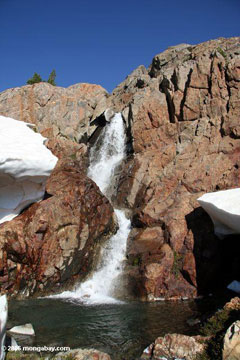Obama talks science: ocean health, water scarcity, climate change, and more
Obama talks science: ocean health, water scarcity, climate change, and more
Jeremy Hance, mongabay.com
September 5, 2008
Presidential nominee Barack Obama recently answered fourteen science-related questions for the organization Science Debate 2008. The questions covered a wide-variety of topics, including the importance of innovation, science and math education, energy policies, national security and biosecurity, genetics research, stem cells, space exploration, health, support for research and restoring scientific integrity in the Whitehouse. Below are brief descriptions of his answers on three topics: climate change, water scarcity, and the health of marine ecosystems.
Republican presidential nominee John McCain has also been sent the same fourteen questions, so far he has not responded.
On Ocean Health
Questioned about what he would do as president to aid embattled marine ecosystems, Senator Obama began with a description of oceans as “crucial to the earth's ecosystem and to all Americans because they drive global weather patterns, feed our people and are a major source of employment for fisheries and recreation”.
 Humpback whale in Alaska |
Noting a direct relationship between marine ecosystem degradation and climate change, Obama states that “protection of the oceans is one of the many reasons I have developed an ambitious plan to reduce U.S. emissions of greenhouse gases 80 percent below 1990 by 2050”. He added that there was a need to gain greater understanding of climate change on marine ecosystems.
Obama pledged to ratify the Law of the Sea Convention stating this will “protect our economic and security interests while providing an important international collaboration to protect the oceans and its resources,” adding that he intends to strengthen The National Marine Sanctuaries and the Oceans and Human Health Acts as a part “a comprehensive ocean policy”.
“As president,” Senator Obama promised, “I will commit my administration to develop the kind of strong, integrated, well-managed program of ocean stewardship that is essential to sustain a healthy marine environment.”
On Domestic Water Crisis
According to Science Debate 2008 thirty-nine US states are expected to experience water shortage over the next ten years.
|
|
Senator Obama believes the place to begin water policy is re-shaping the way America uses this precious resource: “prices and policies must be set in ways that give everyone a clear incentive to use water efficiently and avoid waste. Regulations affecting water use in appliances and incentives to shift from irrigated lawns to ‘water smart’ landscapes are examples”.
Obama states the government has an obligation to provide aid in developing water efficiency techniques: “information, training, and, in some cases, economic assistance should be provided to farms and businesses that will need to shift to more efficient water practices.” He adds that he will establish a national plan to help “high-growth regions” with water management.
Finally, Senator Obama believes that technology will have a vital role to play in protecting water resources: it is “critical that we undertake a concerted program of research, development, and testing of new technologies that can reduce water use”.
On Climate Change
Climate change is arguably the greatest challenge to humanity in the 21st century. America’s current administration spent the majority of its time in power denying climate change, and when the administration admitted to the reality of climate change, they refused to take meaningful action to mitigate its affects.
Senator Obama has made a clear distinction between his perspective on climate change and the current administration’s, saying that he will make climate change a major priority if elected.
|
|
“There can no longer be any doubt that human activities are influencing the global climate and we must react quickly and effectively,” he says, “the U.S. must get off the sidelines and take long-overdue action here at home to reduce our own greenhouse gas emissions. We must also take a leadership role in designing technologies that allow us to enjoy a growing, prosperous economy”.
The presidential candidate pledges to reduce “greenhouse gas emissions by 80 percent below 1990 levels by 2050” through a cap-and-trade system, explaining that such a system “draws on the power of the marketplace to reduce emissions in a cost- effective and flexible way.”
Obama further notes that since climate change is a global issue, it requires close cooperation with the international community, including “contributions from all parts of the world—particularly the rest of the world’s major emitters: China, Europe, and India.”
Senator Obama plans to create a Global Energy Forum with the G8 and 5 other members: Brazil, China, India, Mexico and South Africa. He says that such a forum would make up “the largest energy consuming nations from both the developed and developing world” and “would focus exclusively on global energy and environmental issues.”
In Addition
After allegations of abuse by the current administration in its use of scientific information, Senator Obama has declared to Science Debate 2006 that science must be “uncolored by ideology”. He promised to “restore the basic principle that government decisions should be based on the best- available, scientifically-valid evidence and not on the ideological predispositions of agency officials or political appointees.”
Noting how vital scientific research is to solving many of the world’s greatest problems. Senator Obama pledged to “increase funding for basic research in physical and life sciences, mathematics, and engineering at a rate that would double basic research budgets over the next decade,” adding that “We will increase research grants for early-career researchers to keep young scientists entering these fields. We will increase support for high-risk, high-payoff research portfolios at our science agencies. And we will invest in the breakthrough research we need to meet our energy challenges and to transform our defense programs.” He specifically cited a large expansion of research programs in agencies such as NASA, the National Oceanic and Atmospheric Administration (NOAA), the National Science Foundation (NSF), and the U.S. Geological Survey (USGS).
Go to www.sciencedebate2008.com/www/index.php?id=40 to see Barack Obama’s full answers to all fourteen queries.
















